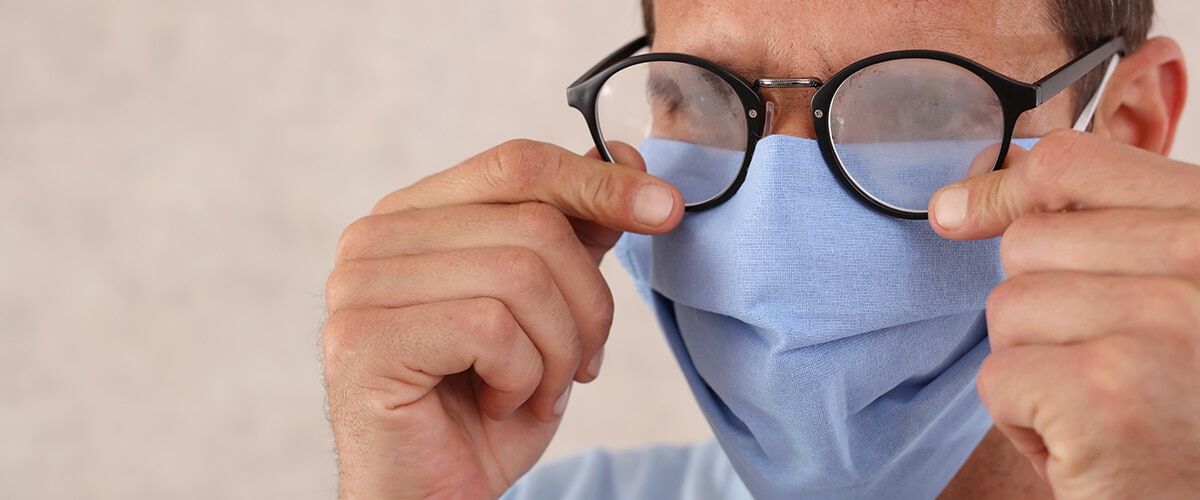Wearing a face mask?
Here are 5 ways to avoid foggy glasses
Face masks are important. They help us avoid unknowingly transmitting Coronavirus, yet, millions of glasses wearers are discovering the nuisance of mask-induced foggy lenses.
With the World Health Organization (WHO) and the UK government now recommending the wearing of face masks to curb the spread of COVID-19, fogged-up glasses are becoming more of a problem.
Your glasses lenses fog up "when warm breath escapes from the top of the mask and lands on the cooler surface of the lens", explains Ceri Smith-Jaynes from the Association of Optometrists (AOP).
This, of course, can make it difficult to see.
According to a study published in The Annals of The Royal College of Surgeons of England, a face mask directs much of the exhaled air upward.
The “misting” of lenses happens when warm water vapour from your breath lands on the cooler lenses, producing tiny droplets that scatter light and reduce the lenses’ ability to transmit contrast (when light colours remain light and dark colours remain dark).
“The droplets form because of the inherent surface tension between the water molecules,” the study’s authors said.
There are a number of ways to prevent this when you're wearing glasses with a face mask, from treating your lenses to adjusting the fit of your mask just so.
1. Wash the lenses with soapy water
The study from The Annals of The Royal College of Surgeons of England supplies a simple solution to the foggy-lens problem, which it refers to as an “annoying phenomenon.”
Authors of the study recommend that before slipping on a face mask, you should wash your glasses or sunglasses lenses with soapy water and shake off the excess moisture. Then, let your glasses air dry or gently dry the lenses with a clean microfiber cloth.
Using this method, the lenses shouldn’t fog up once you put on the mask and glasses, the study says. Why? Cleaning the lenses with soapy water leaves a thin film that reduces the “inherent surface tension” and prods the water molecules to form a transparent layer.
2. Form a seal
A handy little trick that’s quick and easy to do is to hold down the top of the mask using your glasses.
David Hutchfield, Head of Professional Services at Glasses Direct, suggests forming a seal by "pulling your mask up under your glasses and using the frame to weigh it down and form a seal".
He added that surgical tape around the part of the mask that's over the nose also works well.
It also helps to have a pair of glasses that fits perfectly. At Glasses Direct, you can enter the measurements of your current frame into our Best Fit Machine to ensure your new frame is a snug fit.
3. Make sure the mask fits well
A loose-fitting mask lets exhaled air head towards your glasses, but a snug-fitting mask can shoot that air out of the bottom or sides of the mask and away from your glasses.
Smith-Jaynes suggests taking a little time shaping the nose wire on your face mask so that it closely follows the contours of your nose and cheeks.
“If your mask has no wire, you can insert a twist tie or pipe cleaner into the top edge of your mask… Alternatively, fold a tissue until it forms a strip and place it along the top edge of the mask before you put it on.”
This stops warm air from escaping and hitting your lenses.
4. Adjust the loops
Another way to help prevent your glasses from steaming up is to adjust the loops of your face mask.
Smith-Jaynes writes, “If you have a small head, you may find you need to twist the loops before putting them around your ears to get a snugger fit.”
“If the mask has tapes to tie it, tie the top one high on the back of your head after putting on your glasses.”
5. Keep your glasses warm
Another helpful tip from the AOP is to make sure your lenses aren’t cold as this increases the likelihood of fogging up.
They suggest wearing them or putting them in your pocket to warm them up a little bit before putting on your mask.
Be fog-free
By following any of these five simple steps, you can help counteract the unwelcome occurrence of fogged-up glasses. See clearer, stay safe!




